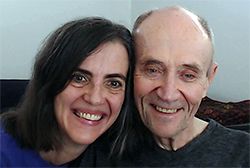Just One Look Forum Archives
Recovery and Rehabilitation
I have seen reports that some might find the use of focused attention as what I've heard referred to as spiritual bypassing or using techniques, mantras etc. to avoid feeling states and I understand this fear since we all repress many many feelings.
The context of fear is gone after the first look. Then we talk about focused attention. I can see how there can be some confusion and perhaps be seen as an avoidance or selectively depriving or accepting of certain sensations etc.
What I read from numerous reports here and my own experience would be the contrary. The recovery period after that first look is very intense and emotions arise and are experienced even more deeply than before the looking. Within the context of fear there will always be repression to a certain degree. Feelings like anger, shame, sorrow are scary. I have done years of therapy to access deep issues from childhood etc. but since the context of fear was still very strong in me old habitual reactions kept coming back. I was hypersensitive and could feel relaxed and happy only in certain environments.
The looking changed everything radically. The immediate self-reliance helped me to welcome and bear all sensations although very painful and overwhelming at times at a much more honest and deep level in my personality. So no repression. A huge difference for me is that particular trauma or habitual reaction doesn't reappear. Usually it's gone without me noticing.
Over time the skill of control over my own attention became more established. I may be aware of a thought or emotion appear, indulge it (eg. have a little cry) or move my attention to my breath. I am deciding for me in that moment. Focused attention is simply an added skill for greater self-reliance not as an avoidance of sensations or feelings.
Beautiful, Maureen. Well articulated. I also liked what you said about feeling more spacious in another post. I connected to this as I feel more space between my emotional experience and 'me.' I can better feel my emotions without fear or difficulty, but if they are very intense, I can then can add space so that they are not as potent or block everything else out. Felt but not overwhelmed. This is kinda new for me and allows some modulation of intensity. I also know that intense emotions will blow by rather quickly and will typically not linger.
Maureen I
The immediate self-reliance helped me to welcome and bear all sensations although very painful and overwhelming at times at a much more honest and deep level in my personality.
I very much agree, Maureen. When the fear is gone, all states can be witnessed, if one chooses so. And I would encourage everybody. It did me good. Resist the temptation to avoid or suppress unwanted states by using guided attention. I say this based on my own experience.
Thank you Maureen. Very well said.
I understand that the infamous period of recovery will be over for everybody who has done the looking, some day. The bulk of fear-borne psychological mechanisms will have left by then. So why is it important to train where to direct one's attention during the recovery period? There will be no need whatsoever to control the attention in a sane mind. A fresh natural intelligence will be guiding the attention in a human recovered from the fear of life. Thus, the only reason to train directed attention in a recovering mind would be its palliative effects. However, this bears the risk of use this method to distort the experiences of life that arise because one fears unpleasant emotions.
Good question Cytex. In my experience unpleasant emotions are unavoidable and as my mind recovers I'm less and less afraid of difficult feelings. Even with attention exercises I still feel the emotions they just don't have as much grip. I feel like I have more control to direct my life despite the emotions. For example yesterday I was invited to an event full of new people. I was tired and felt a bit withdrawn. In the past I would have just skipped it because trying to meet new people when I'm feeling withdrawn would have been difficult. But I went met some really neat people and enjoyed myself. So I guess it's about choice. I could have decided to go home and that would have been fine too. It was subtle but I had redirected away from the habitual response of not socializing when I feel tired and withdrawn.
Also I don't know if the recovery period is ever really over. The most intense parts seem to fall away in the first few years but I think gaining skillfullness over my attention is a lifelong process that will become more subtle as it goes on. I find myself redirecting back to my breath throughout the day. It pulls me out of my train of thought and helps me feel more grounded. I wonder if the attention exercises are just another matter of choice? I find it interesting and helpful to strengthen and redirect my attention. Maybe this really isn't the case for everyone and once the fear is gone the need for attention exercises drops away naturally.
I've also have noticed the stronger my attention is the more potent it is. Running a business my attention is pulled in multiple directions. Using the attention exercises I'm able to pull my attention out of all the details and direct it towards one task. And I can accomplish a lot when the beam is focused on one thing. So for me there's a practical side to focused attention.

